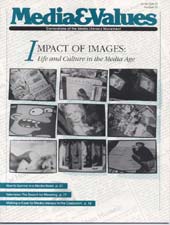Television and Consumption
|
This article originally appeared in Issue# 57
|
Television has the connotation of plenitude; it seems to embody consumer society as a whole. In many households, a television set is on most of the day, the pictures and sound adding up to a steady accompaniment -- or is it a secondhand life?
Available at the touch of a button during almost all hours of the day, its range of choice at times appears to be synonymous with American freedom. For those who do not subscribe to cable, and for almost all the audience during most of the history of television, the flow even appears to be free (although consumers are paying higher prices for products to subsidize advertising).
Even the term "tube" expresses television's material of the good life, through commercials as well as the nonstop flow of programming. "Boob tube" expresses an unconscious connection with regressive oral dependence. Dependence on television is training for adaptation to consumer society.
On the one side, television watching, like the rest of the high-consumption way of life, is motivated by a search for pleasure, escape, and anesthesia; on the other, dependence on television is dependence on the prepackaged forms through which pleasure, escape, and anesthesia can be comfortably and conveniently procured.
— Todd Gitlin, Youth and Drugs: Society's Mixed Messages



